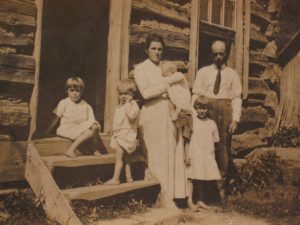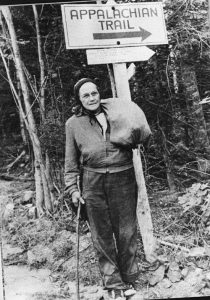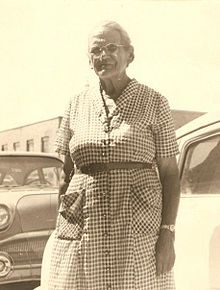 Emma Gatewood was a survivor. When I read the first few lines about her, I thought her story was remarkable, but as I read the whole story, I realized just how remarkable she really was. Emma’s married life was pure torture, with the exception of her children, whom she dearly loved. Emma married her husband, Perry Clayton Gatewood, a 26 year old school teacher, turned farmer, when she was just 19 years old. He was a horrible man, who immediately put her to work building fences, burning tobacco beds, and mixing cement, in addition to her household chores. Three months after their wedding, he started to beat her, a practice he continued until, one day in 1939, he broke her teeth, cracked one of her ribs and bloodied her face. Women didn’t have as many options back then, so Emma was stuck. Because Emma threw a sack of flour at him, the police came and arrested her, not him, and put her in jail. The next day, when the mayor saw her battered face, he took her to his own home, where she remained under his protection until she got back on her feet.
Emma Gatewood was a survivor. When I read the first few lines about her, I thought her story was remarkable, but as I read the whole story, I realized just how remarkable she really was. Emma’s married life was pure torture, with the exception of her children, whom she dearly loved. Emma married her husband, Perry Clayton Gatewood, a 26 year old school teacher, turned farmer, when she was just 19 years old. He was a horrible man, who immediately put her to work building fences, burning tobacco beds, and mixing cement, in addition to her household chores. Three months after their wedding, he started to beat her, a practice he continued until, one day in 1939, he broke her teeth, cracked one of her ribs and bloodied her face. Women didn’t have as many options back then, so Emma was stuck. Because Emma threw a sack of flour at him, the police came and arrested her, not him, and put her in jail. The next day, when the mayor saw her battered face, he took her to his own home, where she remained under his protection until she got back on her feet.
Emma and Perry had 11 children, and unfortunately, the treatment of their mother was not hidden from them. Nevertheless, the story of Emma’s abuse at the hands of her husband went untold for more than a 50 years. In 2014, a newspaper reporter named Ben Montgomery, Emma’s great grand nephew, told her story in his book, “Grandma Gatewood’s Walk.” Emma Rowena (Caldwell) Gatewood passed away on June 04, 1973 in Gallipolis, Ohio, of an apparent heart attack, at the grand old age of 85, having accomplished much since her birth on  October 25, 1887, in Gallia County, Ohio. Her father, Hugh Caldwell, a farmer, had lost a leg after being wounded in the Civil War and in his depression, turned to a life of drinking and gambling. Her mother, Evelyn (Trowbridge) Caldwell, raised the couple’s 15 children, who slept four to a bed in the family’s log cabin.
October 25, 1887, in Gallia County, Ohio. Her father, Hugh Caldwell, a farmer, had lost a leg after being wounded in the Civil War and in his depression, turned to a life of drinking and gambling. Her mother, Evelyn (Trowbridge) Caldwell, raised the couple’s 15 children, who slept four to a bed in the family’s log cabin.
In an interview with her children, Montgomery, who worked for The Tampa Bay Times in Florida. In his research for the book, her surviving children spoke with him and entrusted him with her journals, letters, and scrapbooks. In that material he found stark references to what she had withheld from news interviewers: that her husband had nearly pummeled her to death several times. During one beating, she wrote, he broke a broom over her head. Her children told Montgomery that their father’s sexual hunger had been insatiable and that he forced himself on their mother several times a day. He made their lives a nightmare for years.
The woods became a place of solace and safety for Emma, who would often escape to them amid her husband’s rants. She came to view the wilderness as protective and restorative. In 1937 she left him and moved in with relatives in California. She was forced to leave behind two daughters, ages 9 and 11, who were still at home. Emma knew her husband would not beat the girls, and she could not afford to take them with her. She wrote to the girls to explain it to them, making sure not to leave a return address. In the letter, she wrote, “I have suffered enough at his hands to last me for the next hundred years.” Nevertheless, Emma couldn’t stand to be away from her girls any longer, so she returned after a few months. Her life became a prison after that. Her husband would not let her out of his sight. She later wrote that in 1938, he beat her “beyond recognition” 10 times. “For a lot of people the trail is a refuge,” Brian B. King, a publisher of guidebooks and maps for the Appalachian Trail Conservancy, said in a telephone interview. “But seldom is it a refuge for something as bad  as that.” A short time later, her husband left for good, filed for divorce, which was granted in 1941, and he was out of her life.
as that.” A short time later, her husband left for good, filed for divorce, which was granted in 1941, and he was out of her life.
Emma’s hiking became a saving grace for her…she loved it. In 1949, she came across a National Geographic magazine article about the Appalachian Trail and became intrigued to learn in reading it that no woman had ever hiked it solo. In 1954, in her first attempt at hiking the Appalachian Trail, she started out in Maine, but broke her glasses, got lost, and was rescued by rangers, who told her to go home. Undaunted, she tried again in 1955, starting from Georgia this time. She was 67 years old, a mother of 11, a grandmother and even a great-grandmother when she became the first woman to hike the entire Appalachian Trail by herself in one season. She would go on to repeat the feat 2 more times. Soon everyone was calling her “America’s most celebrated pedestrian.” In 1959, Emma went on to conquer the 2,000 miles of the Oregon Trail, trekking alone from Independence, Missouri to Portland, Oregon.


3 Responses to Grandma Gatewood